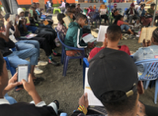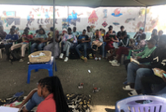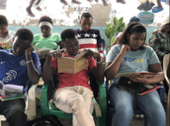Instructor Handbook of Unplugged and Online Lesson Plans (K-5)
Faster download
Language: en
Details: WHO MADE THIS? Code.org We believe that every student should have the opportunity to learn computer science, and the reasons are far more varied than simply having a strong resume. Critical thinking, logic, persistence, and creativity help students excel at problem-solving in all subject areas, no matter what their age.
Summary: Code.org’s research-based curriculum uses a spiraling education design, in which concepts and skills are revisited in each course while delving deeper each time. Each course experience is a blend of online activities and "unplugged" activities (lessons in which students can learn computing concepts with or without a computer). The online experiences are composed of mostly self-guided and self-paced tutorials, which use scaffolded sets of programming instructions to explore and practice algorithmic thinking. The unplugged lessons take a hands-on, often kinesthetic approach, making use of physical manipulatives to model computational concepts. 1 Each course consists of about 18 to 22 lessons, each lasting between 25 and 45 minutes. They can be taught at a comfortable pace whether in consecutive days as a sub-unit or one day a week for 18 weeks. The content of each course builds conceptually on the previous course, so that a student can progress through all four experiences learning new concepts along the way. Code.org’s K-5 curriculum aligns to CSTA Computer Science Standards and ISTE standards, while some lessons also integrate national Math, English Language Arts, and Science standards. The use of Computer Science Themes scaffolds the development of ideas and recognizes the continual construction of knowledge:
- Algorithms, Loops, Functions, Variables, Conditionals
- Data
- Abstraction, Decomposition, Pattern Recognition
- Computing Practice and Programming (Use of computational tools)
- Computers and Communication Devices (Elements of computing devices and networks)
- Community, Global, and Ethical Impacts
- Creativity
- Collaboration
- Communication
- Persistence
- Problem Solving








